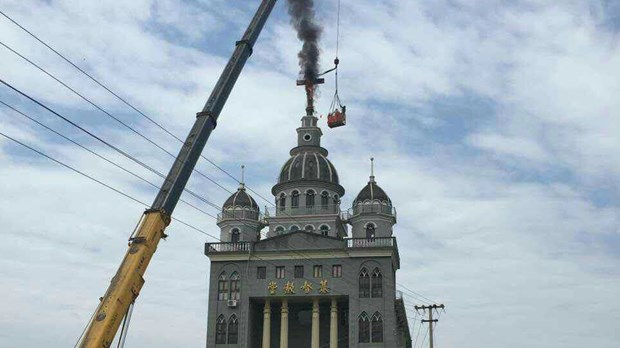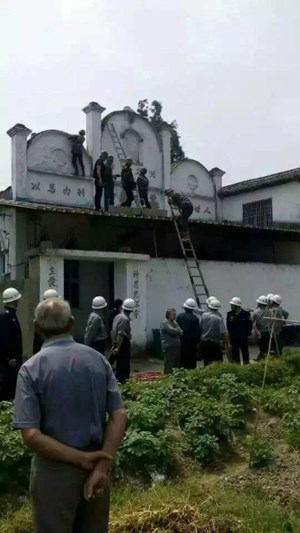China, the Epitome of Human Rights Respect
"We must resolutely guard against overseas infiltrations via religious means and prevent ideological infringement by extremists. [The Chinese Communist Party must be] unyielding Marxist atheists, consolidate their faith, and bear in mind the Party’s tenets."
"[Religions in China must] Sinicize."
Chinese President Xi Jinping
 (Photo: Reuters/Lintao Zhang/Pool)
(Photo: Reuters/Lintao Zhang/Pool)During a news conference held in Ottawa after Canada's Minister of Global Affairs met with China's Foreign Minister Wang Yi, a journalist from the web outlet iPolitics posed a query about China's human rights record. The reaction from Mr. Wang was swift and scalding; he was outraged at the impertinence of the question. It was, he said, a reflection of "arrogance", it was "irresponsible", and it was "full of prejudice".
Journalism and news reportage in the Communist world of Beijing is not what it is in most Western democracies where journalists have the freedom guaranteed them by the constitutions of most countries to freely ask questions that have the potential of being embarrassing to the sensitivities of politicians who have much to answer to, to fulfill their obligation in a free world to explain themselves and their policies to the people who elect them.
The Chinese Communist Party is answerable to no one, not least the people whom they dictate to, who must accept whatever poses as news from the state-controlled media. Human rights abuses are rampant in China, ranging from oppression of religious minorities, most notably Falun Gong, and accusations of insulting the state and engaging in espionage, all resulting in long prison sentences.
China's occupation of Tibet, its threats against neighbours in the East and South China Seas all represent its punishing brand of abuse.
Canada's inept and integrity-challenged foreign minister asserts that he had raised the issue of human rights with Minister Wang on the treatment of journalists, but added it is not his job to defend Canadian journalists working in Canada when confronted with someone of Mr. Wang's ilk, bringing the sensibilities of his state into a foreign country. China's integrity and record on human rights is unblemished and beyond questioning.
"What has been happening in Zhejiang is a test. If the government views it [the cross-removing campaign] as a success, it will be expanded."
Fan Yafeng, independent legal scholar, Beijing
 Courtesy of China Aid
Courtesy of China AidIn the vast country that is China, a Communist, irreligious political system preferring secularism bound to the quasi-religious conviction of state communism, there are around 60 million Christians. Other minority religions exist as well, in their hundreds of millions out of China's 1.3-billion population. There are those who practise Buddhism, Taoism, Islam as well, which along with Christianity are considered major faiths in the country.
Their active religious presence is of nagging concern to President Xi Jinping who would far prefer that Chinese concentrate their veneration and respect on communism. Faith in communism is all that people need, and by conviction and extension his government. Christianity is particularly abhorred by President Xi, seeing in it a challenge to the primacy of the state. Even the strict regulation of Chinese spiritual life does not satisfy him, with the presence of state-approved churches, all others being illegal.
A campaign has been ongoing in Zhejiang Province where one of China's largest most active Christian populations exist. A trial persecution of the Christians there has been in the making for the past several years and more where a campaign removing crosses from church spires has created a chaos of decapitated churches. Steeples have been cut off along with their crosses, while riot police block parishioners from interfering. Crosses lie toppled on tops of church roofs on in yards, or are buried.

Courtesy of China Aid
Zhejiang cross removal
In two years' time authorities have torn crosses from 1,200 to 1,700 churches in the province, at times after clashes with worshippers attempting to stop the carnage, turning violent. In China, it can be no surprise that many human rights lawyers are Christians. Many who protest against Mr. Xi's religious policy express the very opinion that he so fears; that rights are given by God, not the state. That corrupted frame of mind inspired Mr. Xi to convene a "religious affairs work conference".
Because of the crack-down on churches Chinese have responded by abandoning the government approved and registered churches in favour of attending unregistered, outlawed churches in greater numbers. The underground congregations are seen as manifestations of peoples' rights to attend the religious communities of their choice and the government's heavy-handedness has not had the desired effect of turning people away from Christianity.
In the town of Shuitou where state workers cut across the steeple of the Salvation Church the venue became a resistance center with hundreds of parishioners encircling the church in an effort to protect the cross. Hundreds of riot police responded by injuring church members resulting in photographs of bruised and battered Christians showing massively on social media along with websites of advocacy groups overseas.
A senior church leader, speaking in anonymity for obvious reasons, confessed that he and others agreed to remove their cross voluntarily rather than see the church demolished if they failed to act. "More than three decades ago, we didn't even have a church. Persecution in church history has never stopped. All we can do is pray", he said mournfully.
Of course none of this has anything to do with human rights abuses.

Courtesy of China Aid
Zhejiang cross removal
Labels: China, Human Rights, Religion

<< Home